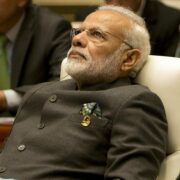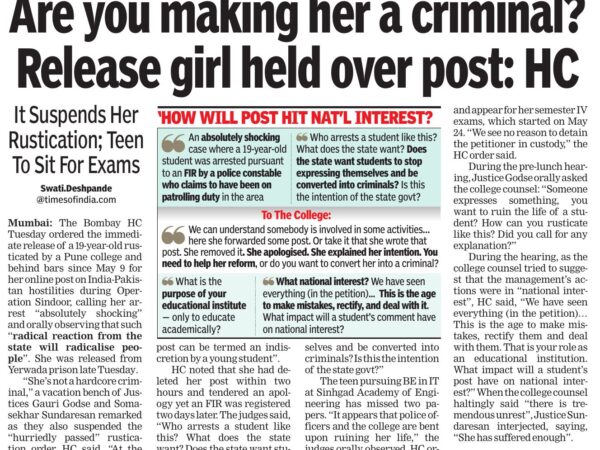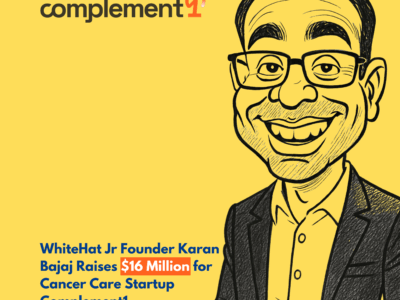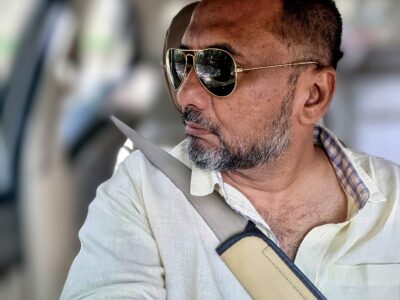
Ark B leaving Earth.
In the Hitchhiker’s Guide To The Galaxy, Douglas Adams speaks of a planet Golgafrincham, the residents of which intend to get rid of the useless “middlemen” like telephone sanitisers, account executives, hairdressers, tired TV producers, insurance salesmen, personnel officers, security guards, public relations executives, and management consultants. To do this, they conspire to circulate stories of the imminent doom of the planet due to some cosmological event, and convince everyone that the only solution is to relocate to another hospitable planet. They form three groups and designate three ships, called Ark A, B, and C to move the massive population. Ark A and C are supposedly for all the people who made the planet run by actually doing useful work while Ark B is to carry the useless folks. Of course, they aren’t told they are useless, but that they need to be the first wave on this new planet so as to prepare it for the arrival of the other two ships. Ark B takes off and crash-lands on this new home for the Golgafrinchans, but as per plan, Ark A and C never leave, basically cleaning the planet Golgafrincham of the “bunch of useless idiots” who are now stranded on a planet far away and have to repopulate it with their limited to non-existent intelligence, skills, and abilities. Of course, the joke isn’t complete until it is revealed that the planet chosen to crash Ark B is Earth.
Why is this joke relevant here?
Because I want you to imagine a situation in which, if you were an alien who wanted all the people who really did the useful work on Earth to self-identify themselves and segregate themselves from the other useless folks so you could kill them easily and take over the planet, you could not have chosen a better method than to release a virus that forces Earthlings to go into a “lockdown”, ensuring that literally the only people still moving about, congregating, meeting, and being in proximity with each other are the highly selected group of people without which the Earth cannot function. These people form the highest risk group for contracting and then infecting others with the virus, because the other, less useful people, are self-quarantined in their own houses and “working from home”.
Imagine, for example, the Commissioner of Police of a large city contracting the virus, or say a beat constable in some small part of that large city getting infected. How high are the chances that the entire police force will soon come down with it? Very high, right? Ditto other emergency workers, like doctors and nurses, like electrical linesmen and sewage plant operators, like the Army and Coast Guard, like the postman and pharmacist, like the food factory worker and the milkman, like the butcher and the farmer, all of whom are exempted from the curfew and are therefore highly exposed to contagion.
We have literally created a small group of highly important workers without whose work this Earth cannot function, and instead of isolating them and protecting them from dying, we have isolated others and forced these very people to carry on working as usual.
That’s not even a joke, because there is actually no other way to make the world run. We need these people to do what they do in the same manner as every day for this world to work. Of course, we tell them to take precautions and we educate them about safety and infection, and so on. We give them equipment and clothing to safeguard their health, and we give them training to ensure that they remain as risk-free as possible. But honestly, tell me, if you had another alternative, would you still choose self-isolation of this sort, where those without whom the world can very well function stay home, and those who are absolutely crucial for the survival of the species are exposed to the deadliest disease in the last 100+ years?
Is there an alternative?
Well, the jury is still out on many things:
- Is India really that badly affected or is there something we don’t know that has kept the worse from our shores till now?
- Does a lockdown work on a countrywide basis?
- What is the worst-case scenario?
- What would you do?
I do not know the answer to question 1. I believe no one does at this moment. I am hoping that miraculously, India escapes the worst, either through some genetic mutation we Indians carry that makes us slightly more resistant or maybe even impervious to the virus, or we develop a herd immunity (another fascinating topic, if you are interested in such things) or that a vaccine is developed, tested, produced, and administered quickly enough before massive damage is caused. The cases, as reported in India, seem rather paltry and the pace of contagion seems slower. And this is even before the lockdown. Maybe we got lucky. Because as far as the “lockdown” goes, it is a sham where forget about it being total or near-total, it is just about as close to a Bharat Bandh in terms of how little contact there is between people. Indeed, it looks exactly like one of those bandhs we kids from the 1970s and 80s are so used to. Nothing more. Nothing less. Hardly a nationwide lockdown! Once again, as I said, I have explained my reasons in earlier posts and won’t bother repeating them here. If India is not badly affected, it would be a miracle or a stroke or luck, not the lockdown. Most definitely not the lockdown.
As for question 2, there are various schools of thought. Some countries have fully locked down (Italy) and some are partially (China). Some have resisted the urge (Switzerland and Pakistan). And some are talking of opening up again (USA). There is no specific data that a lockdown can end the pandemic. Not because of any other reason but for the fact that we simply don’t have enough data. We do not know who is reporting what, when, and how. In the sense, are some cases of Covid19 being reported as severe influenza by some, or are countries releasing selective or maybe stale data, or are the same standards of reporting being followed by everyone? It is confusing at the moment because there are no cures, there are no vaccines (yet), and there are only trials & errors, mostly errors till now.
The one big success has been Wuhan, or so it seems with what China says (please pass the salt shaker). But they did MANY things, of which we do not know what really helped. Of course, they went into lockdown (after the initial hesitancy and the usual Chinese denial of reality), but they also did aggressive testing, super-fast increase in health facilities, and tried all kinds of combinations to see what works, whether in drugs or other treatments. They also, not to put too fine a point on it, disregarded human rights and sacrificed openness and transparency, which comes naturally to their political ideology. Did it work? As I said, no one knows just yet. As of now, it seems there are no new cases. But we may still have carriers who could show symptoms a few weeks later, or pass them on to others, or remain asymptomatic carriers till the next winter when we might see a return of the outbreak. Who knows? So, on question 2, to repeat, the jury is still out.
Has India done a good thing by locking itself down? I think I have answered it in my previous posts written the day before yesterday and yesterday. The short answer is “No”. And that is not because a lockdown is ineffective (as I said, no one knows for sure yet) but because even if it looks like the best bet against the virus on paper, in practice a country the size of India, with all its attendant issues of where we find ourselves on the development scale, is not just impossible, but perhaps akin to self-harm…I’d go so far as to consider it suicidal in the current economic and social scenarios.
Let us see if someone has answered question 3. There are many experts who have weighed in on that and while their opinions are diverse (and many of them outdated, given how fast this situation is evolving), here are some interesting observations, from 70% of the world to a wiping off of the great apes, to a Nobel laureate who looked at the data and concluded that even in extreme cases like the Diamond Princess Cruise ship contagion, infections peak at 20%, and that we are over-reacting. The chances of dying are also being calculated with margins so wide (1% to 12%) that it makes no sense to take any of them as guidance.
Suffice to say that the worst-case scenarios range from apocalyptic to business-as-usual, and only in hindsight can we say how bad it really got.
The Modified Trolly Problem
I believe that what we are facing is a real-life trolly problem. Those who haven’t heard about it but want to learn about this fascinating mental exercise on morality are in for a treat (start with basic Wikipedia and then go on to other, more interesting sites like the Stanford Encyclopaedia of Philosophy, and then on to where it may lead).
We must decide whether we want to remain unquarantined but open for business and take our chances with infections or we want to go into a lockdown and hope that it works while knowing it will mess up the economy, possibly killing or at least affecting the long-term survival negatively of many poor people with no access to the privileges enjoyed by most of my readers. To do nothing would be to possibly condemn the weak, the old, and the poor to immediate death. To pull the lever and lockdown would mean a possible gradual death to the very same population, and perhaps even those that are not poor or weak or old. As a nation, we must take a call. Our PM took his. Other heads of governments are taking theirs. There are no right or wrong answers.
Here is an excellent take on the Covid19 crisis and the choices humanity faces. But you are not here to read about what others are talking about, right? I am assuming you want to know the answer to question 4.
So, here goes. What would I have done?
Ah, now we come to the real question. I believe the way to tackle this would have been:
- Stop international travel into and out of the country. That reduces one variable.
- Print money. Lots of it. Don’t worry about devaluation or sovereign default. It is a default only if 2 out of 100 countries do it. Not if 98 do it. The world will have to find ways to deal with this once it is over. And chances are, we may come out stronger economically at the end of this. So, don’t worry about this.
- Start with doubling the healthcare capacity, mainly hospitals and pathology testing laboratories, in the country. Create a vehicle (Indian Hospitals Limited? IHL). Dish out contracts to the top 5 market cap leaders to build them. Give them tax breaks. Allow them priority in clearances and transportation of raw material. Keep all contracts transparent online for the public to see. These hospitals will be owned and run by IHL, which will go public and raise money from people at some point (maybe even immediately, with the government pledging to put in the balance that cannot be raised). This will give a fillip to the infrastructure sector. Follow up with projects to build roads, railway tracks, bridges, and so on.
- Increase budgets of national-level research labs by 1,000%. Make all PhD and post-doctoral education in medicine and related fields free provided the candidate can pass an entrance test.
- Double the number of pharma manufacturing units, forming a PSU just like IHL and operating it similarly.
- Buy testing kits. From everyone. At whatever price. Enough for each and every Indian to be tested. Thrice over.
- Start testing. If positive, quarantine and isolate in a healthcare facility. If not, let free with another test due in a month. Repeat after every 30 days for 3 months. Test everyone. Every. One. Like how we carry a polling booth all the way for even one single voter up a mountain and through rivers and jungles just so that one voter can vote? Like that. Test everyone. Thrice.
- Encourage masks everywhere. Spend lots of money on advertising and PR personal hygiene. Write protocols for public service providers (like hospitality, airlines, etc) to ensure that not only are hygiene standards adhered to, but also are highly visible to the consumers. Build confidence.
- Publish numbers. Tested. Negative. Infected. Cured. Dead. Publish details of city and state. Publish graphs. Keep the world, and your people, informed.
- Once the vaccine is ready, start aggressive inoculation. Spare no one. Listen to no lobby or religious group. Everyone gets vaccinated. Science trumps bullshit. Simple.
- Until that time, encourage anyone over 70 to reduce exposure to the outside world. Help local governments to create systems to reach food, medicine, and other services to these citizens for free.
This might sound selfish, for there seems to be some collateral damage in-built into it. But think about it. There’s collateral damage built into a lockdown too. But in a lockdown, just as the downside is low, the upside is low too. That being said, the low downside in a lockdown is based on hope. No one knows if a lockdown actually will stop the virus. And everyone knows a total lockdown, or even a near-total one is impossible. So, why not take the route of slightly higher risk but where the upside is significant?
Or do I speak too much as a businessman and less as a socially conscious, empathetic human?
N.B: Remember, I am not in control of the country. Probably, just as well. So, do not heap your abuses on me. I neither control nor influence decisions happening at that level. In fact, I am so powerless and poor that I can hardly influence decisions at my own life and family’s level. This is just a narcissistic take on a hypothetical situation in a make-believe world. It is also an opinion. Mine. You need not agree with it. I am not forcing you to. I cannot. But feel free to engage in the comments. I would love to know how I am wrong, because somehow, I am sure the leftists will think I am a capitalist dog pig with no concern for the elderly and the nationalists will think I am anti-Indian for suggesting the PM took the easy route out. So, I can’t win. Just like this situation we find ourselves in. So, I choose to do what I preach: Take the option with the most upside, because the downside on all choices is the same.


















